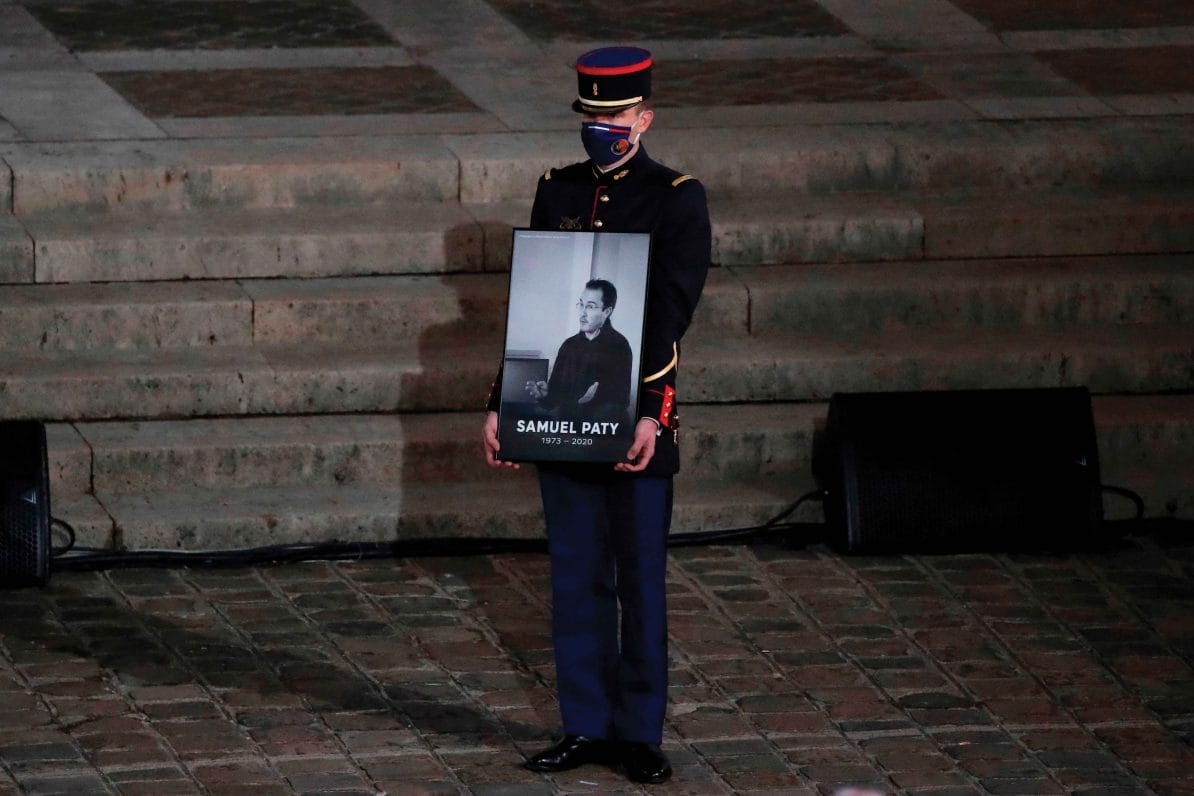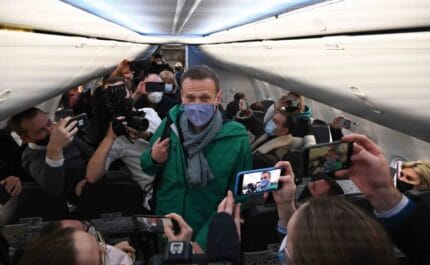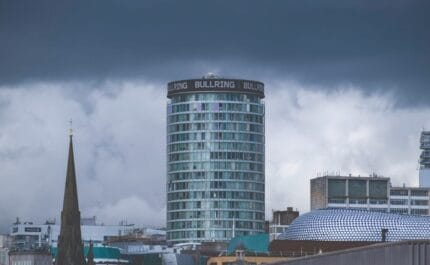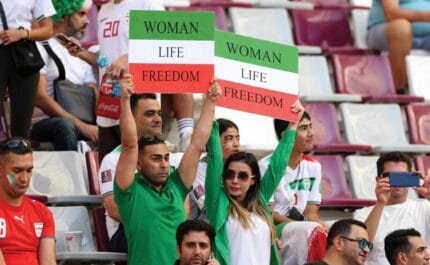Moment that mattered: Teacher Samuel Paty is decapitated in a terror attack in France
In autumn 2020 we spoke to Politico's senior correspondent Rym Momtaz about the beheading of a teacher in Paris in a terrorist attack that shook the world

A French Republican guard holds a portrait of Samuel Paty at the Sorbonne University in Paris on 21st October 2020, during a national homage to the teacher. Photo: Francois Mori/Pool/AFP
16th October 2020 (Taken from: #41)
“The beheading of a teacher in a Paris suburb hits you hard,” says Rym Momtaz, the Paris-based senior correspondent for Politico. Momtaz covered terrorist attacks across Europe as well as the battles for Raqqa in Syria and Mosul in Iraq before moving to her current focus on French politics, but was still stunned by the events of 16th October. “You keep going back to this fact: that someone went to a school, waited for a teacher to come out and beheaded him right there in the street, in public. It’s crazy.”
In early October 2020 middle-school history and geography teacher Samuel Paty had shown two cartoons depicting the Prophet Mohammed in a civics education class about freedom of expression. He invited anyone who thought they might be offended to close their eyes or briefly stand in the corridor. The drawings had been published in satirical magazine Charlie Hebdo in 2012 and had triggered an Islamist attack on the publication’s offices and a kosher supermarket in 2015 in which 17 people died.
The news that Paty had shown the cartoons spread online after one of his female Muslim students told her father about it, who vented his anger on social media. On 16th October, Paty was accosted in the street outside the Collège du Bois d’Aulne in Conflans-Sainte-Honorine by 18-year-old Abdullakh Anzorov, a Muslim of Chechen descent who had moved to France as a refugee at the age of six. Anzorov, who had never met Paty, had no connection to the school and who lived 60 miles away, attacked the teacher and cut his head off with a cleaver. When police arrived on the scene, he took aim at them with an air rifle and they shot him dead. In a tragic twist to the story, in March 2020 Le Parisien newspaper reported that the female student whose father made the complaints about Paty online had lied about being at school on the day the cartoons were shown.
The murder took place in a time of heightened tensions in France, a backdrop which Momtaz and her colleagues at Politico were keenly aware of. “The trial of the 2015 Charlie Hebdo [attackers] was going on, and we were all on high alert for some kind of attack,” says Momtaz. “There had also been a stabbing of two people outside the former Charlie Hebdo headquarters in late September by someone who didn’t know that they had moved offices. So it didn’t come out of nowhere. But it was still absolutely shocking.”
France has suffered from the most terrorist attacks of any western country in recent times
Paty’s death triggered an outpouring of anger in France. Many were incensed that a man had been murdered for teaching his students about the country’s cherished secular traditions and the right to exercise free speech. Others saw the display of the cartoons in a classroom as gratuitously provocative, and an indication that the feelings of Muslims are of little account in the French republic.
“France has suffered from the most terrorist attacks of any western country in recent times. It is a real trauma in this society,” says Momtaz. On 21st October, at a memorial service for Paty at the Sorbonne university, President Emmanuel Macron described him as the face of the republic and posthumously awarded him with the Légion d’honneur, France’s highest honour. “He was killed because the Islamists want our future,” said Macron, “and they know that with quiet heroes like [Paty] they will never have it.”
Two weeks before the attack on Paty, Momtaz was covering a speech by President Macron in the northern city of Les Mureaux about the fight against ‘separatism’, defined as attempts by small groups in French society not to live by the norm of the nation’s social traditions. Macron talked about the insidious effects of the creation of a parallel order by radical Islamism which, he said, is “gradually resulting in the rejection of the freedom of expression, freedom of conscience and the right to blaspheme and [also] in us becoming insidiously radicalised”.
“The speech was very nuanced and Macron talked about the very real security issues that France has suffered from,” says Momtaz. “He was also the first president to say that the French governments have not done enough to help children of immigrants feel like they are equal citizens with non-immigrant children.”
In the speech, Macron talked of how “We ourselves have built our own separatism. It’s the separatism of our neighbourhoods, it’s the ghettoisation which our republic – initially with the best intentions in the world – has allowed to occur… We’ve created neighbourhoods where the promise of the republic has no longer been kept, and therefore where there was an attraction to those messages, those most radical configurations, which were sources of hope.”
“It was a huge step for him to say that,” says Momtaz. “It is not something that people in France talk about, because here there is no hyphenated identity. You are not Algerian-French. You are French. You are not Muslim-French. You are French. They do not have these approaches that exist in the UK or in the US because those are multicultural societies, whereas France rejects the idea of multiculturalism.”
Certain sections of the address caused controversy. “In typical Macron fashion he had two sentences that were too provocative and that overshadowed his speech,” says Momtaz. “Those two sentences were that ‘Islam is in crisis all over the world’ and that he wanted to forge ‘a type of Enlightenment Islam in France’. I saw the debate online afterwards and many Muslims were appalled to hear a president of a secular liberal democracy think that it is his right to say such things about the religion of more than a billion people.”
After Paty’s death, Macron set about putting his plan into action, spurred on by a further Islamist attack at a church in Nice on 29th October in which three people were killed. A charter was produced with the help of the country’s Muslim Council that recognises the primacy of republican over religious values and rejects the notion of Islam as a political movement. Imams across France were pressured to sign it. Macron also moved to stop foreign imams from preaching in the country.
On 9th December 2020, on the 115th anniversary of the 1905 law enshrining “laïcité”, the French version of secularism, a new bill designed to reinforce “respect for the principles of the republic” was approved by the French cabinet. It contains measures to combat hate speech, forced marriages, polygamy and the provision of virginity certificates by doctors. It will bring an effective end to religious home-schooling and extends the ban on the wearing of religious attire at work. A new criminal offence is also to be created in a direct response to Paty’s murder – that of the endangering of life through the spreading of information that allows people to be identified by those who want to hurt them.
The bill was characterised by Prime Minister Jean Castex as freeing Muslims from the influence of radical Islamists. Its critics, however, argue that it will further stigmatise French Muslims, some of whom may be in agreement with foreign leaders including Recep Tayyip Erdogan of Turkey and Imran Khan of Pakistan, who have both accused the French government of encouraging Islamophobia.
“The new law is all about the measures that should be taken to… make sure that republican values are applied,” says Momtaz. So far there has been no significant new move to address the social divisions between immigrant and non-immigrant citizens highlighted in Macron’s Les Mureaux speech. “We’re still waiting to see when those are going to come into play,” says Momtaz.
Samuel Paty’s murder wasn’t the starting point of this debate and it won’t be the end point
It remains to be seen whether the new measures make France safer in the long run. They are unlikely to calm the arguments around French values, however. “Samuel Paty’s murder wasn’t the starting point of this debate and it won’t be the end point. It was one episode in a very long-running conversation,” says Momtaz. “It draws on so many things – the country’s colonial past, what happened afterwards with the immigrant populations that came to France, the ban on the headscarf [in schools and for public servants at work], the caricatures of the Prophet Mohammed, the different approaches to freedom of speech…
“What’s interesting is that when you talk calmly to people on each side of these conversations, they have well-documented historical context and examples to back up their views,” continues Momtaz. “What I have a hard time trying to figure out is whether these two sides are even reconcilable at this stage. Is there a space where the sides can come together and find a compromise? It seems right now that positions are very zero-sum, so what does that mean for French society and for social cohesion in the country? I don’t think that anyone has an answer to that, but it’s a truly existential debate.”
Slow Journalism in your inbox, plus infographics, offers and more: sign up for the free DG newsletter. Sign me up
Thanks for signing up.








